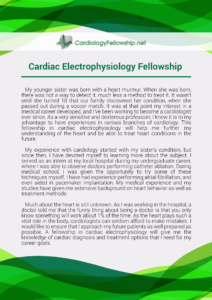Cardiac Anesthesia Fellowship Programs
Cardiac anesthesia is considered a sub-specialty of anesthesiology rather than internal medicine. In order to be eligible for an ACGME (Accreditation Council for Graduate Medical Education) accredited cardiac anaesthesia fellowship it is necessary to have completed an ACGME accredited residency in anesthesiology. Most programs are approximately one year in length and are applied to using the CAS (Central Application Service) provided through the San Francisco (SF) Match.
Stuggle with writing cardiac anesthesia fellowship personal statement? Check out the best tips and advice from experts!
A List of 10 of the Best Cardiac Anesthesia Fellowships
As with any medical specialty the more prestigious the institution, the more opportunities that are available to you after completing the program. There is no official ranking of the top cardiac anesthesia programs available. However, here is an unofficial list of the top ten cardiac anesthesia programs you can apply to:
 Harvard University/Beth Israel Deaconess Medical Center: Boston, Massachusetts
Harvard University/Beth Israel Deaconess Medical Center: Boston, Massachusetts- University of California, San Francisco: San Francisco, California
- Johns Hopkins University: Baltimore Maryland
- University of Pennsylvania: Philadelphia, Pennsylvania
- University of Washington: Seattle, Washington
- University of California Los Angeles: Los Angeles, California
- University of Pittsburgh: Pittsburgh, Pennsylvania
- Washington University: Saint Louis, Missouri
- Mayo Medical School Rochester, Minnesota
- University of California San Diego School of Medicine La Jolla, California
Here you can find efficient info about cardiology fellowship match 2019.
Documents to Submit When Applying to Cardiac Anesthesia Programs
There are a number of documents you will need to assemble and submit when applying to cardiac anesthesia programs. There may be some slight variation from institution to institution but generally you should be prepared to submit the following:
- Completed CAS application form
- CV/Resume
- Personal statement
- USMLE scores
- MSPE (Medical Student Performance Evaluation)/Dean’s letter
- Medical school transcript
- ITE (In-Training Examination) scores
- Three (3) letters of recommendation
Make sure to check with each particular program from these best cardiology fellowship programs to ensure they don’t have any additional requirements.
Tips for Applying to Cardiac Anesthesia programs
First you applied to medical school, then a residency program and now a fellowship program. As you progress applying never becomes easier or less stressful. Getting into one of top cardiology fellowship programs is competitive and the quality of applicants you are up against will likely be higher than for medical school and residency programs. Here are a few tips to improve your chances of being accepted:
- Work hard on your personal statement: Many applicants tend to underestimate the influence the personal statement can have on the selection process. There will probably be many well qualified candidates for available fellowships. The personal statement is about you and who you are and will let admissions know if you are a good fit for their program.
- Be realistic: How do your qualifications stack up against applicants that are usually accepted at the programs you are applying to? Sure you want to get into the best program and if that’s what you want then go ahead and apply for it. However don’t put all of your eggs in one basket. Apply for several programs to improve your odds of matching.
- Apply to your home program: If the institution where you did your residency offers a cardiac anesthesia fellowship you should apply. Your chances will be as good or better there than at any other institution
Common Mistakes Applicants to Cardiac Anesthesia Programs Make
Here are some of the mistakes that cardiac anesthesia program applicant make the most frequently:
- Starting late: It takes time to put your application package together and there is a deadline for applying to fellowship programs. Get an early start on preparing your application materials.
- Submitting a generic personal statement: A personal statement should be unique and show who you are as an individual. Submitting a personal statement that sound like a few hundred others does nothing to help your application
- Failure to proofread: Many of the applicants to fellowship programs will have similar qualifications to your own. Small things can often be what make the difference. An application with spelling mistakes or other errors can quickly put you out of the running. Proofread meticulously


